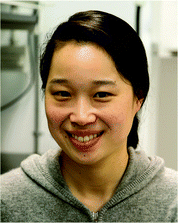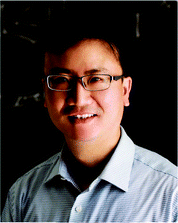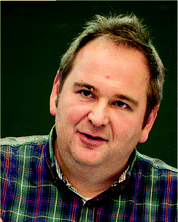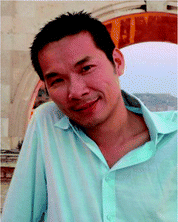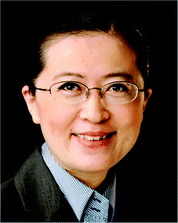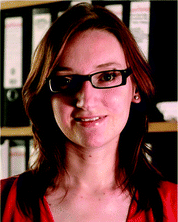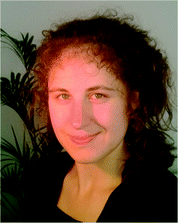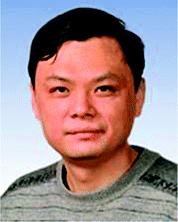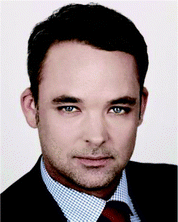Contributors to the emerging investigators issue 2014
Michelle C. Y. Chang started her independent career in 2007 with a joint appointment in the Departments of Chemistry and Molecular and Cell Biology at University of California, Berkeley.
(1) What aspect of your research are you most excited about at the moment?
We are able to use exogenous chemical means to directly control protein activity and study protein–protein interactions inside living systems.
(2) What is the best part of your job?
I can learn new things every day. In a sense, my job is “get paid to learn”.
(3) What do you do in your spare time?
Watch football games! I am a football fan and enjoy watching football games in my spare time. I will spend quite a bit of time watching the world cup this summer.
(4) Can you tell us a little known fact about yourself?
I now have two lovely sons, one is 3 years old and the other is only 3 months old now.
(5) If you weren't a scientist, what would you do?
I may have become a professor in finance. Besides Chemistry, I have a double BS degree in Economics and I could have been majored in Economics or Finance in Graduate School and become a professor there.
(1) What aspect of your research are you most excited about at the moment?
Two-dimensional materials mark the final frontier of materials science at least in one dimension: as we have reached the atomic level we cannot get thinner. This marks the ultimate frontier of miniaturization and we have reached it! So we are confronted with the question: what alternative to further miniaturization has nature to offer? Possibly, the answer is in exploiting weird electronic properties, such as spintronics or even valleytronics.
(2) What is the best part of your job?
Every day a surprise. It never gets boring. Frontier science is really unpredictable. I like this surfing on chaos, quickly reacting to the developments of science, discuss new results and the possibilities that emerge from them, adopting research directions accordingly.
(3) What do you do in your spare time?
As my profession is also my hobby, there is “just” family and friends left. With them, I like to travel, cycling, play Frisbee, play board games or have some nice get-togethers.
(4) Can you tell us a little known fact about yourself?
I always wanted to become a chemist. I grew up in the Commodore 64 generation in Eastern Germany where computers were rather rare. I was at an elite high school for chemistry where they had some professional computers and there I first saw some molecular modelling that really fascinated me. A professor told me, though: “If you want to do that, then you’d better study physics.” I took his advice.
(5) If you weren't a scientist, what would you do?
I never considered an alternative.
(1) What aspect of your research are you most excited about at the moment?
(i) Simple catalysts and methods that non-specialists can use; (ii) Increased understanding of reaction mechanisms.
(2) What is the best part of your job?
The freedom to think and do research.
(3) What do you do in your spare time?
Day dreaming.
(4) Can you tell us a little known fact about yourself?
I no longer check work email at home – they call it work life balance.
(5) If you weren't a scientist, what would you do?
Master chef.
(1) What aspect of your research are you most excited about at the moment?
My research group has a long-standing interest in developing water-dispersible organic nanomaterials for sensing and imaging applications. Currently, we are very excited about bright organic nanoparticles containing fluorogens with aggregation induced emission characteristics for fluorescence imaging and dark fluorescent conjugated polymer nanoparticles for photoacoustic imaging.
(2) What is the best part of your job?
I have the freedom to choose research topics and arrange my time accordingly. I enjoy every piece of work I do.
(3) What do you do in your spare time?
Play with my two children.
(4) Can you tell us a little known fact about yourself?
I enjoy reading science books rather than literature and novels in general. I love fishing and gardening.
(5). If you weren't a scientist, what would you do?
Probably be a chef.
(1) What aspect of your research are you most excited about at the moment?
The interplay between radical and cationic mechanisms in reactions involving alkene and alkyne functionalizations. After working with gold for quite some time I got used to think “cationically”; only recently I started to realize the power behind the combination of cationic and radical species.
(2) What is the best part of your job?
Its unpredictability. No two days will ever be the same; the reaction you designed does not give you the expected outcome but maybe a different, even more interesting one… it's like a magician's hat: you throw something in, but you never know what you are going to get out.
(3) What do you do in your spare time?
I (try to) do some sport: I like diving and hiking as both activities truly connect me with nature. I also enjoy the time with good friends, especially with good food.
(4) Can you tell us a little known fact about yourself?
I am the only scientist in my family and thus my mom still nowadays asks the things she used to ask during my PhD thesis… something like “So…did the reactions work today?” It's a good way for me to put things in perspective.
(5) If you weren't a scientist, what would you do?
If I would have had a bit of talent, I would be an artist: I love to paint, sculpt and create things with my own hands.
(1) What aspect of your research are you most excited about at the moment?
Developing novel concepts for artificial photosynthesis; in particular through discussions with colleagues and students. The field is still at a relative early stage, which leaves plenty of space for novel and creative ideas. I am currently very keen on investigating photo(electro)catalysis with heterogenised molecular catalysts and curious to see where it will take us.
(2) What is the best part of your job?
The freedom to do whatever I am enthusiastic about (within reason) and to see talented students growing and developing with their work. I also enjoy the dynamic nature of our work as we can come up with ideas and test the hypotheses often quicker than in many other disciplines.
(3) What do you do in your spare time?
Maybe ask me this question again when we run out of ideas.
(4). Can you tell us a little known fact about yourself?
Bonfires make me happy: the season starts in January in my garden.
(5). If you weren't a scientist, what would you do?
As I typically don't have a Plan B, I would probably be in trouble!
What aspect of your research are you most excited about at the moment?
While our earlier work has used the combination of a variety of tools (computation & experiment) to investigate and challenge mechanistic details, we have recently made the transition to designing reactivity that is on first inspection counterintuitive to the general reactivity trends. This demonstrates a proof-of-principle study of a computational reactivity design, a very exciting avenue of research in our lab. Moreover, we are currently also excited about exploring a variety of reactivity concepts relating to organometallic reactivity that we have uncovered throughout our earlier fundamental mechanistic work.
(1) What aspect of your research are you most excited about at the moment?
Some of the unnatural amino acids we synthesized for protein engineering have potent biological activities, and even have the potential to be drugs, how surprising!
(2) What is the best part of your job?
Making surprising discoveries every day.
(3) What do you do in your spare time?
Play poker or sports.
(4) Can you tell us a little known fact about yourself?
I decided that I would be a chemist in high school. At that time I wanted to work on nitrogen fixation and photosynthesis.
(5) If you weren't a scientist, what would you do?
I would be a philosopher.
(1) What aspect of your research are you most excited about at the moment?
There are so many interesting aspects in our research at the moment, which makes it difficult for me to pick one. I do believe, however, one really exciting aspect is the unusual reactivity results we see from making a molecule feel uncomfortable by introducing high charges. This concept may have not received enough attention in the scientific community yet and I am convinced that novel concepts in synthesis will result.
(2) What is the best part of your job?
In my job no day is exactly the same. I like to explore things, face new challenges and get new interesting research results. The excitement of retrieving a new crystal structure or observing unexpected results, e.g. by NMR, can make my day.
(3) What do you do in your spare time?
Listening to music, cooking and scuba diving.
(4) Can you tell us a little known fact about yourself?
The principal aspects of my personality are being straightforward, upfront, and dedicated.
(5) If you weren't a scientist, what would you do?
Become a chef and open a restaurant near the sea.
| This journal is © The Royal Society of Chemistry 2014 |

